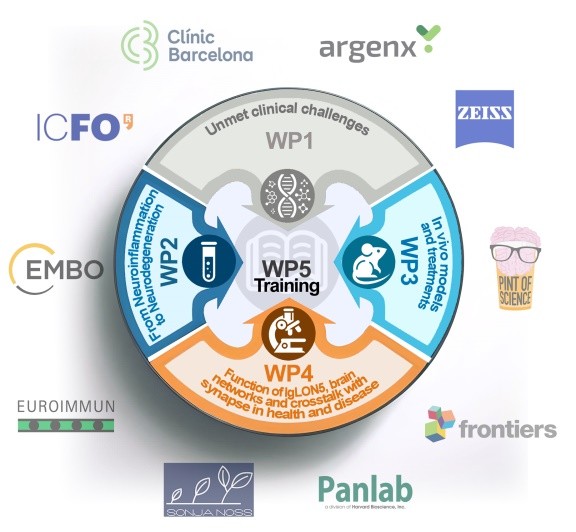YOUR BROWSER IS OUT-OF-DATE.
We have detected that you are using an outdated browser. Our service may not work properly for you. We recommend upgrading or switching to another browser.
PI Lidia Sabater, (Hospital Clínic de Barcelona), PI at WUST Marcin Poreba
Anti-IgLON5 disease is a recently described encephalopathy associated with a variety of neurological symptoms that can be life-threating. The clinical course is mainly chronic and the response to immunotherapies is suboptimal. The hallmark of the disease is the presence of antibodies against IgLON5, a cell adhesion molecule predominantly expressed on the neuronal membrane. Surprisingly, neuropathological findings on autopsies revealed the presence of an atypical neuronal brainstem tauopathy, establishing a link between neurodegeneration and IgLON5 antibodies. IGNITION aims to establish an innovative, interdisciplinary doctoral training program to foster the next generation of scientists at the interface of neuroinflammation and neurodegeneration. The unique program will train 13 Doctoral Candidates across four key objectives: 1) addressing clinical challenges in diagnosing and managing anti-IgLON5 disease, 2) investigating the role of neuroinflammation in neurodegeneration, 3) developing animal models for therapeutic testing, and 4) analysing the function of IgLON5 in health and disease. These objectives will be pursued using cutting-edge molecular, cellular, and in vivo techniques, offering a comprehensive research training experience with the support of leading biotech and diagnostic companies. IGNITION will advance our understanding of the mechanisms behind anti-IgLON5 disease, contributing to scientific innovation and providing tools for improved diagnosis and prognosis. The gained insights will extend to the broader field of neurodegeneration, offering potential breakthroughs for other tauopathies, including Alzheimer’s and Parkinson’s disease. Through its research and training activities, IGNITION will foster scientific excellence, increase disease awareness, and provide societal and economic benefits through the development of new diagnostic and therapeutic strategies across Europe.
